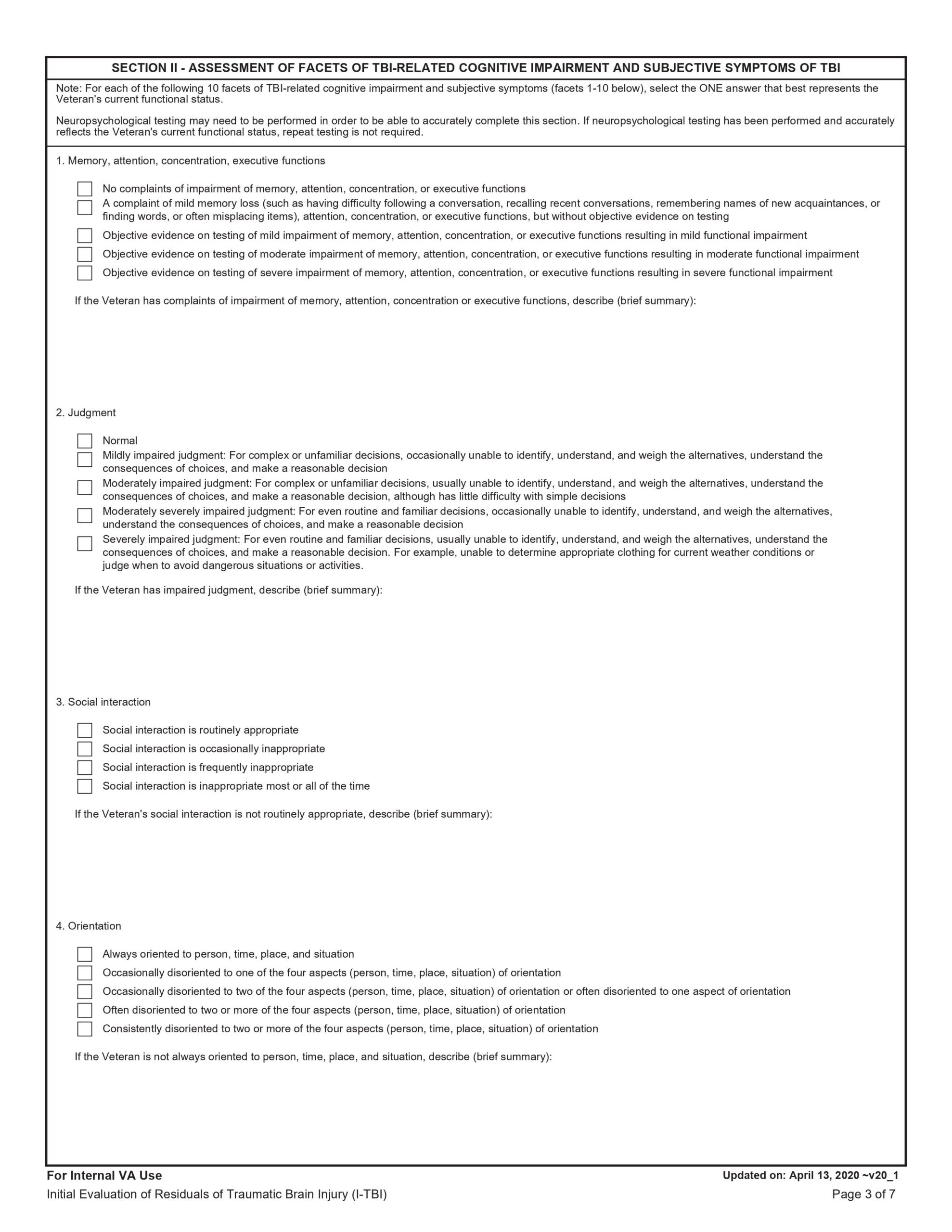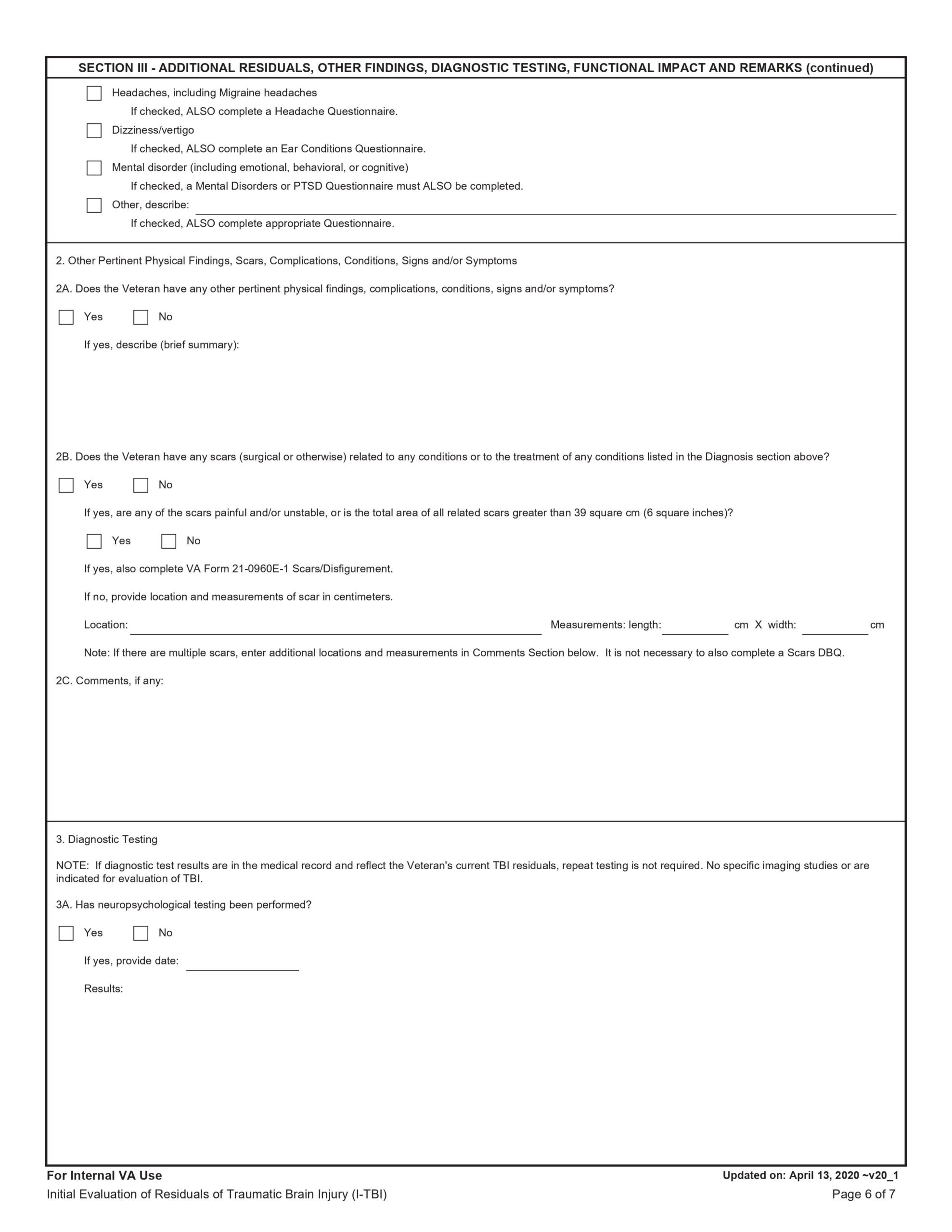When it comes to applying for disability benefits through the U.S. Department of Veterans Affairs (VA), understanding the Traumatic Brain Injury (TBI) Disability Benefits Questionnaire (DBQ) is crucial.
The information you provide in this questionnaire plays a significant role in evaluating the Veteran’s claim.
This guide is designed to help you navigate the TBI DBQ, ensuring that you have the necessary information to maximize your disability benefits claim.
What is a DBQ?
A Disability Benefits Questionnaire (DBQ) is a standardized form used by the VA to collect essential medical information during a C&P Exam.
It is a vital component of the disability claims process, allowing healthcare providers to document the Veteran’s medical condition accurately.
Click here for the latest DBQs from the VA.
Why is the TBI DBQ Important?
The TBI DBQ is particularly important for veterans with Traumatic Brain Injury.
Completing this form correctly can have a significant impact on the outcome of your disability claim.
A thorough understanding of the TBI DBQ and how to use it effectively can increase your chances of obtaining the benefits you deserve.
Step-by-Step Guide to the TBI DBQ
The TBI DBQ is divided into several sections, each addressing specific aspects of your condition.
Let’s break down each section in detail:

Section I: Diagnosis and Medical History
In this section, you will provide information about the diagnosis of TBI, the date of diagnosis, and any comments related to the diagnosis. You’ll also specify if the Veteran has ever had a TBI or any residuals of a TBI. If so, you’ll describe the condition and provide details about the diagnosis.

Section II: Assessment of Facets of TBI-Related Cognitive Impairment and Subjective Symptoms of TBI
This section assesses various facets of TBI-related cognitive impairment and subjective symptoms. It includes questions about memory, attention, concentration, executive functions, judgment, orientation, social interaction, motor activity, visual spatial orientation, subjective symptoms, and neurobehavioral effects. You’ll describe the Veteran’s current functional status for each facet.



Section III: Additional Residuals, Other Findings, Diagnostic Testing, Functional Impact, and Remarks
In this section, you’ll report any additional residuals or conditions related to TBI, such as sensory dysfunction, hearing loss, visual impairment, seizures, gait, coordination, and balance issues, speech problems, and more. You’ll also provide information on diagnostic testing, scars, and any other pertinent physical findings or complications. Finally, you’ll describe the functional impact of the Veteran’s TBI-related conditions on their ability to work.



Section IV: Certification
The last section requires the physician’s signature, printed name, National Provider Identifier (NPI) number, and medical license and state number. It certifies the accuracy and completeness of the information provided.

Common Mistakes to Avoid
As you complete the TBI DBQ, be mindful of common errors:
- Ensure that you fill out all sections thoroughly and accurately.
- Maintain consistency in the information you provide between sections and align it with the Veteran’s medical records.
- Seek professional assistance or guidance when completing the DBQ, especially if you encounter difficulties or uncertainties.
Conclusion
Completing the TBI DBQ is a crucial step in your quest to secure VA disability benefits for Traumatic Brain Injury.
By following this guide and avoiding common mistakes, you can ensure that your claim is well-documented and stands a strong chance of being approved.
Don’t hesitate to seek professional guidance from a veteran law attorney to further enhance your ability to navigate this process effectively.
Think You’re Owed Benefits and Were Denied? Remember, Your Time is as Important as Your Claim
Your moments are precious, don’t waste them on legal complexities of trying to fight an appeal.
Get your free case evaluation with us today.





